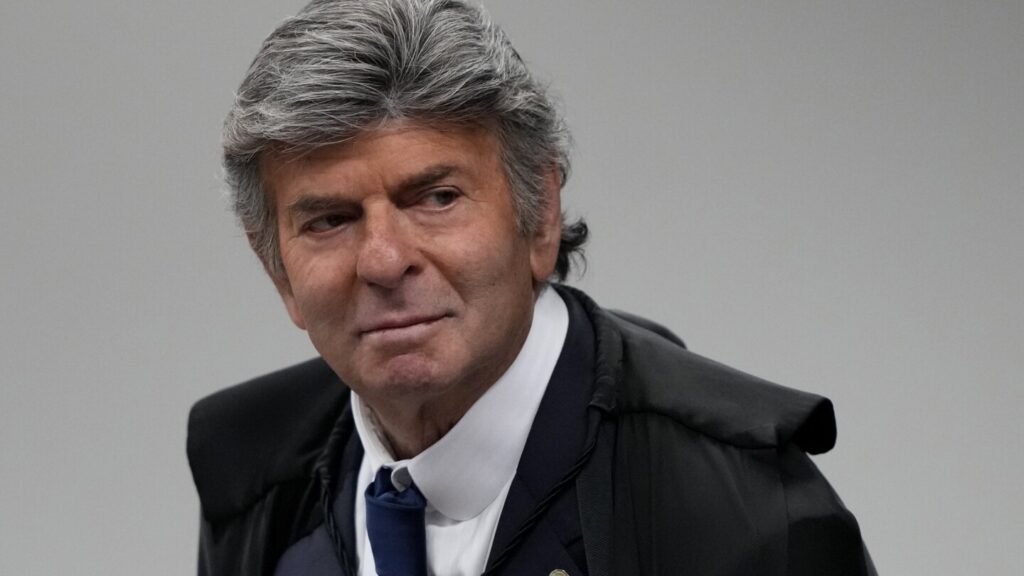BRASILIA, Brazil (AP) — A Brazilian Supreme Court justice voted Wednesday to acquit former president Jair Bolsonaro of all charges in his alleged coup trial, in the first dissenting vote since the final judicial proceeding began, giving some respite to the far-right leader and potential arguments to his defense team for an appeal after a final verdict.
The 70-year-old ex-leader faces a five-member panel of justices who started voting Tuesday on accusations he attempted to illegally hang onto power after his 2022 electoral defeat to current President Luiz Inacio Lula da Silva. Two justices have already voted to convict him.
Prosecutors charged Bolsonaro with five counts: attempting to stage a coup, armed criminal organization, attempted violent abolition of the democratic rule of law, damage characterized by violence and a serious threat against the state’s assets and deterioration of listed heritage.
Despite Wednesday’s vote by Justice Luiz Fux, the ex-leader could still be found guilty in the coming days, with two justices remaining to vote and a simple majority of three sufficient to convict.
Two more judges are expected to cast their votes on Thursday and Friday, preceded by lengthy statements.
The third vote
Justice Fux opened the dissent Wednesday in full disagreement with Justice Alexandre de Moraes, the rapporteur of the case, and Justice Flávio Dino, who both previously voted.
“No one can be punished for cogitation,” Fux said. “A coup d’état does not result from isolated acts or individual demonstrations lacking coordination, but rather from the actions of organized groups, equipped with resources and strategic capacity to confront and replace the incumbent power.”
The Brazilian justice dismissed all four other accusations and repeated in his vote several arguments used by Bolsonaro’s defense, including comparisons between the riots in capital Brasilia on Jan. 8, 2023 to actions of protests by anarchist group Black Bloc in 2013.
“For facts to be considered crimes, they must fit the letter of the criminal law as a glove fits the hand,” said Fux, who previously ruled to convict dozens of Bolsonaro supporters who were involved in the riots.
Fux agreed with Bolsonaro’s lawyers in several topics. He said the case should be tried by a low court judge, argued the former president’s defense did not have enough time to prepare and said former director of Brazil’s intelligence agency, Alexandre Ramagem, should not be on trial.
“I am vindicated,” Celso Vilardi, a lawyer for Bolsonaro, told journalists during Fux’ vote, which was started at 9 a.m. local time and continued into the evening as the justice voted on the future of other defendants.
Long-term implications
The historic coup trial will impact next year’s general elections and beyond.
If convicted, Bolsonaro would face increased pressure to pick a political heir to likely challenge Lula next year. A conviction could also compel allied lawmakers to seek some amnesty for him through congress.
In 2023, Brazil ’s top electoral court barred Bolsonaro from competing in elections until 2030 for abuse of power.
Fux also ruled for the country’s top court to throw out the case, saying it was not within the Supreme Court’s jurisdiction. That gives the far-right ex-leader a higher chance of success in an appeal and also opens way for him to score political points with his supporters.
Polarizing vote
Fux’s votes generated an avalanche of reactions on social media, with allies of the former president saying the justice is honoring the robe, and dissenters denouncing Fux as a coup supporter.
Jason Miller, an ally of Trump’s, said on social media platform X that Fux “is completely destroying” de Moraes in his vote.
“The accusations against President Bolsonaro are fraudulent and unconstitutional,” Miller wrote. His comments were shared by Eduardo Bolsonaro, a lawmaker and son of the Brazilian leader, who lives in the U.S. and advocated for sanctions against de Moraes.
The Trump administration then sanctioned de Moraes in July, citing a law that is normally used against human rights abusers.
Bolsonaro’s trial got renewed attention after U.S. President Donald Trump linked a 50% tariff on imported Brazilian goods to his ally’s legal situation, calling it a “witch hunt.” Observers say the U.S. might announce new sanctions against Brazil after the trial, further straining their fragile diplomatic relations.
Lawmaker Lindbergh Farias, the leader of Lula’s Workers’ Party in Brazil’s lower house, also took to social media to criticize Fux’ ruling.
“Fux is doing more than (Bolsonaro’s lawyer) Celso Villardi,” said Farias, who also criticized the justice for convicting plea bargain signatory Mauro Cid, a former aide-de-camp who incriminated the former president in his testimonies.
“The butler is to blame! Fux is convicting the aide and absolving the one who gives the orders,” the leftist lawmaker said.
Bolsonaro’s final sentence will be announced after all members of the panel vote. His lawyers will likely try to appeal to the full Supreme Court of 11 justices, which is now more likely after Fux’s ruling.
_____
Hughes reported from Rio de Janeiro.

